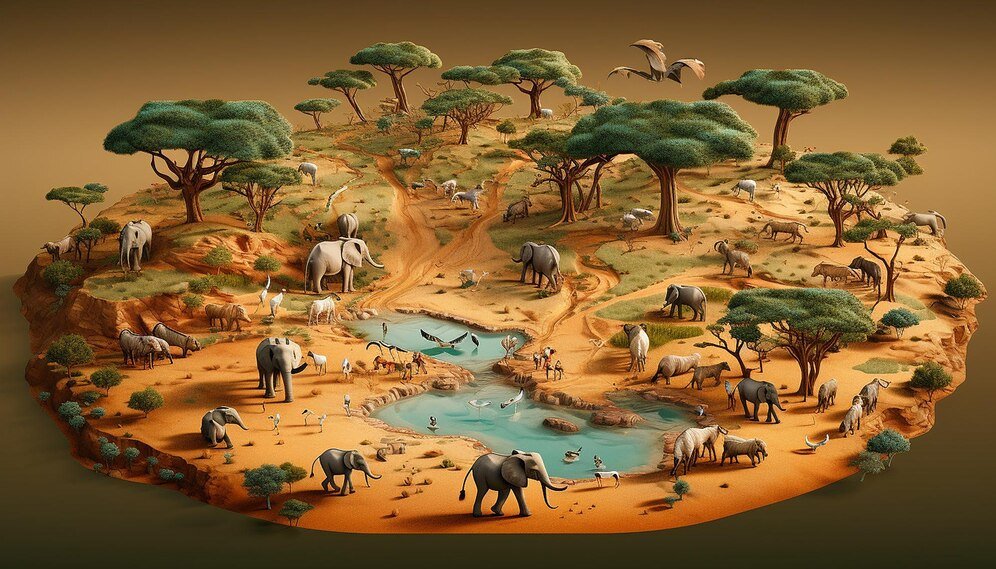Travel
West Africa: Exploring the Diversity and Richness of a Region
West Africa is a vibrant and culturally diverse region situated on the westernmost part of the African continent.

West Africa is a vibrant and culturally diverse region situated on the westernmost part of the African continent. Encompassing 16 countries, including Nigeria, Ghana, Senegal, and Mali, West Africa is renowned for its rich history, diverse landscapes, and vibrant cultural heritage. Let’s delve into the fascinating tapestry of this region and explore its many facets.
With its vast expanse stretching from the Atlantic Ocean to the Sahel, West Africa boasts a diverse range of ecosystems, from lush rainforests to arid deserts. This geographical diversity has contributed to the region’s rich biodiversity and made it a hotspot for ecotourism. Moreover, West Africa holds significant geopolitical importance due to its strategic location and abundant natural resources.
Geographical Features
West Africa’s landscape is characterized by a variety of geographical features, including rolling plains, dense forests, and expansive savannas. The region is home to several major rivers, such as the Niger, Senegal, and Volta, which serve as vital sources of water for irrigation, transportation, and hydroelectric power generation. Additionally, West Africa boasts numerous lakes, including Lake Chad and Lake Volta, which support diverse ecosystems and provide sustenance to local communities.
Cultural Diversity
One of the defining features of West Africa is its cultural diversity, with hundreds of ethnic groups coexisting harmoniously across the region. Each ethnic group has its own unique traditions, customs, and languages, contributing to the rich tapestry of West African culture. From the vibrant textiles of the Ashanti people in Ghana to the intricate beadwork of the Yoruba in Nigeria, the region’s cultural heritage is as diverse as it is vibrant.
Historical Significance
West Africa has a rich and storied history, dating back thousands of years to the rise of ancient civilizations such as the Ghana Empire, the Mali Empire, and the Songhai Empire. These empires played a crucial role in shaping the cultural, economic, and political landscape of the region and left behind a legacy of architectural marvels, such as the Great Mosque of Djenné and the Walls of Benin. Additionally, West Africa has a complex colonial history, with European powers vying for control of lucrative trade routes and natural resources.
Economic Landscape
The economies of West Africa are diverse and multifaceted, driven by a combination of agriculture, industry, and natural resource extraction. The region is rich in mineral resources, including gold, diamonds, and oil, which have attracted significant foreign investment. Agriculture also plays a vital role in the region’s economy, with staple crops such as cocoa, coffee, and palm oil being major export commodities.
Tourism Attractions
West Africa is home to a wealth of tourist attractions, ranging from ancient archaeological sites to pristine natural wonders. The region boasts several UNESCO World Heritage Sites, including the old town of Timbuktu in Mali, the slave route in Ghana, and the historic town of Grand-Bassam in Côte d’Ivoire. Additionally, West Africa is blessed with breathtaking natural landscapes, such as the cascading waterfalls of Guinea and the lush mangrove forests of the Niger Delta.
Music and Arts
Music and arts are integral parts of West African culture, with a rich tradition of storytelling, drumming, and dance. The region has produced some of the world’s most influential musicians, including Fela Kuti, Miriam Makeba, and Salif Keita, whose music has transcended borders and inspired generations. Traditional West African instruments such as the djembe, kora, and balafon continue to be revered for their unique sounds and craftsmanship.
Cuisine
West African cuisine is as diverse as its culture, with each country boasting its own unique culinary traditions and flavors. Staples such as rice, cassava, and plantains form the basis of many dishes, which are often accompanied by spicy sauces and savory stews. Popular West African dishes include jollof rice, fufu, and moi moi, which reflect the region’s rich culinary heritage and diverse agricultural landscape.
Religion and Beliefs
West Africa is home to a wide range of religious beliefs and practices, including Islam, Christianity, and indigenous spiritual traditions. Islam is the dominant religion in the Sahelian countries of West Africa, while Christianity is prevalent in countries such as Nigeria, Ghana, and Liberia. Additionally, many West Africans adhere to traditional indigenous beliefs, which center around the worship of ancestors, spirits, and deities.
Modern Challenges
Despite its many strengths, West Africa faces numerous challenges in the modern era, including political instability, economic inequality, and environmental degradation. Conflicts and civil unrest continue to plague the region, hindering development efforts and exacerbating poverty and inequality. Moreover, the impacts of climate change, such as droughts, floods, and desertification, pose significant threats to the region’s agricultural productivity and food security.
Efforts for Development
In response to these challenges, various regional organizations and international partnerships have been established to promote peace, stability, and sustainable development in West Africa. Organizations such as the Economic Community of West African States (ECOWAS) and the West African Monetary Union (UEMOA) work to foster cooperation and integration among member states, while international donors and development agencies provide financial assistance and technical expertise to support initiatives in areas such as education, healthcare, and infrastructure development.
Future Prospects

Despite the challenges it faces, West Africa holds immense potential for growth and development in the years to come. With its youthful population, abundant natural resources, and strategic location, the region is well-positioned to capitalize on emerging opportunities in sectors such as renewable energy, digital technology, and agribusiness. By investing in education, innovation, and sustainable development practices, West Africa can chart a path towards prosperity and inclusive growth for future generations.
Conclusion
West Africa is a region of immense diversity and richness, encompassing a tapestry of cultures, landscapes, and histories that captivate the imagination and inspire awe. From its ancient civilizations and colonial legacies to its vibrant arts and culinary traditions, West Africa offers a wealth of experiences for travelers and scholars alike. Despite its challenges, the region’s resilience and resourcefulness continue to shine through, offering hope for a brighter and more prosperous future for all who call it home.
Unique FAQs
What are some must-visit tourist destinations in West Africa?
Some must-visit tourist destinations in West Africa include the historic town of Timbuktu in Mali, the slave route in Ghana, and the vibrant markets of Senegal.
What is the traditional attire worn in West Africa?
Traditional attire in West Africa varies by ethnic group and occasion but often includes colorful fabrics such as kente cloth and wax prints, adorned with intricate patterns and designs.
What role does music play in West African culture?
Music plays a central role in West African culture, serving as a form of communication, storytelling, and celebration. Traditional instruments such as the djembe and kora are revered for their cultural significance and unique sounds.
How is the cuisine of West Africa influenced by its diverse cultural heritage?
The cuisine of West Africa is influenced by a diverse range of cultural traditions, including those of the various ethnic groups, as well as colonial influences from Europe and the Middle East. This fusion of flavors and ingredients has resulted in a rich and diverse culinary landscape.
What are some of the key challenges facing West Africa today?
Some of the key challenges facing West Africa today include political instability, economic inequality, environmental degradation, and the impacts of climate change. Efforts to address these challenges require collaboration and cooperation at both the regional and international levels.
Table of Contents
-

 Tech1 year ago
Tech1 year agoHow to Use a Temporary Number for WhatsApp
-

 Business2 years ago
Business2 years agoSepatuindonesia.com | Best Online Store in Indonesia
-

 Social Media1 year ago
Social Media1 year agoThe Best Methods to Download TikTok Videos Using SnapTik
-

 Technology1 year ago
Technology1 year agoTop High Paying Affiliate Programs
-

 Tech10 months ago
Tech10 months agoUnderstanding thejavasea.me Leaks Aio-TLP: A Comprehensive Guide
-

 FOOD12 months ago
FOOD12 months agoHow to Identify Pure Desi Ghee? Ultimate Guidelines for Purchasing Authentic Ghee Online
-

 Instagram3 years ago
Instagram3 years agoFree Instagram Auto Follower Without Login
-

 Instagram3 years ago
Instagram3 years agoFree Instagram Follower Without Login




















